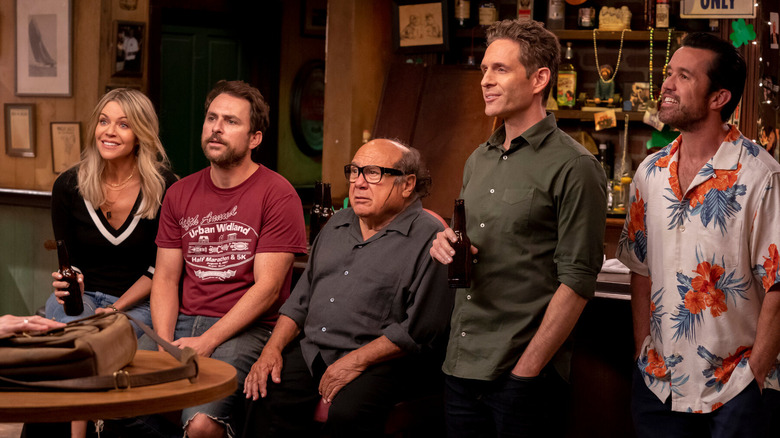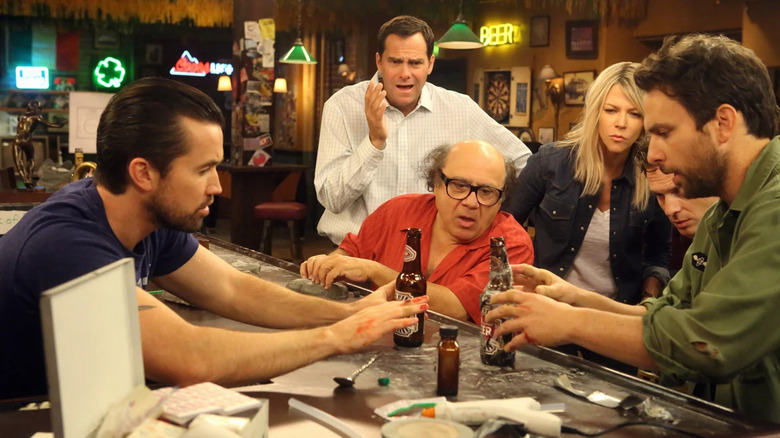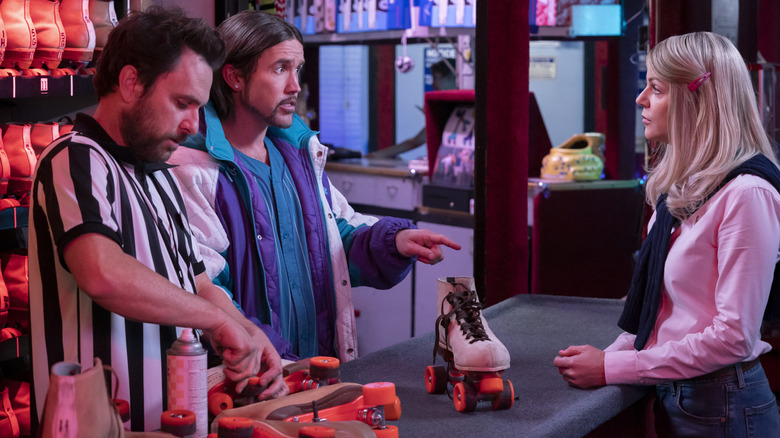Rob McElhenney Thinks This Is The Key To Keeping It's Always Sunny In Philadelphia's Fresh
It's difficult to nail down the recipe for success when it comes to creating a TV show. If it were easy, every show would be a hit. But in the case of "It's Always Sunny in Philadelphia," the key ingredient has a lot to do with its home at the cable channel FX.
TV shows come in all shapes and sizes, and one of the main things that dictate their direction is if it is a network or cable series. The creative hands of the networks are often tied by the Federal Communications Commission, made famous by George Carlin's 1972 "Seven Dirty Words" bit. However, cable shows have more creative freedom, unencumbered by the FCC's stricter broadcast guidelines. Additionally, the size and scope of a network series are much larger than that of cable programming.
On its way to becoming the longest-running live-action sitcom in television history, "It's Always Sunny in Philadelphia" blazed its own trail by playing by a different set of rules. But how does a successful show stay fresh for so long? Even "Happy Days" only made it five seasons before literally "jumping the shark." One of the "It's Always Sunny" creators has a theory on why the show always seems topical, and it has to do with a big difference between network and cable TV.
They operate on a different schedule
For decades, the standard model for broadcast television was 26-episode seasons. Traditionally, once a show got to 100 episodes, it would enter syndicated reruns, opening another revenue stream. While it was profitable for networks, it was a grind on production crews and actors.
The cable model of 10- or 13-episode seasons was borne from necessity. As the New York Daily News reported, cable channels simply couldn't afford a full production slate of 26 episodes. But as the saying goes, necessity is the mother of invention, as viewers and show creators both seemed to gravitate to the abbreviated half-season model (later often whittled down to 10).
Noah Wyle, who starred in NBC's long-running hit medical drama "ER" and TNT's "Falling Skies," sees a difference. He told the New York Daily News:
"When I was doing 'ER,' we'd joke about the 'episode 13 to 17 malaise.' You'd feel like you were sleepwalking and repeating a lot of what you'd already done. [In 'Falling Skies'] We could push to 12, maybe, but if we went beyond that, we'd start having storylines where I find someone's wallet and try to figure out how to return it."
Shortened seasons also mean half the production time. That's attractive to actors, allowing cable to snag some big stars for their programming. From a creative standpoint, many writers agree a shorter run is a better model for tight, cohesive story arcs. And while some network shows have adopted the cable model with abbreviated seasons, there's still a line drawn between the expectations of a network and cable show.
Which brings us back to the longest-running live-action sitcom on TV. The change in episode numbers has played a big role in keeping "It's Always Sunny in Philadelphia" relevant all these years.
They're keeping up with social changes
It's getting hard to remember a time "It's Always Sunny in Philadelphia" wasn't on television. For 17 years "the gang" has entertained audiences with their crass, nihilistic view of the world. It's a formula that co-creator Rob McElhenney says works because of cable television.
In an interview with Rolling Stone heading into the show's 14th season, McElhenny credited shortened seasons with the show capitalizing on changing culture. McElhenny said:
"Because the world seems to change so much from a cultural perspective every few years, each year gives us a bunch of new cultural things that have changed that we can mine. That's always been what we try to do with 'Sunny.' Just have the same discussions that people are having in any given year."
McElhenny also believes that shorter seasons help the gang avoid burnout. "We have the luxury of only doing 10 episodes a year, that's huge. It allows us to have a tremendous amount of free time," McElhenny told EW. "So when we come back and it takes six or seven months to make this series, we're fresh. And then beyond that, it's because we all still love it and we're still having fun, and there's no disconnect between the writers and the actors because we're one and the same."
With the advantage of shortened seasons and no shortage of political strife and culture wars to adopt for episodes, there's no reason "It's Always Sunny in Philadelphia" can't continue another 17 years.


